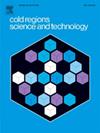基于冻结特性曲线的土岩混合物广义导热模型
IF 3.8
2区 工程技术
Q1 ENGINEERING, CIVIL
引用次数: 0
摘要
土岩混合物是筑路和堤坝的重要土工材料,广泛分布于寒冷地区。导热系数是寒冷地区岩土工程中定性评估传热性能和确定温度场的重要参数。本研究通过实验研究了岩石含量和温度变化对土岩混合物导热系数的影响,并建立了基于冻结特性曲线的广义导热系数模型。结果表明,岩石含量和水冰相变都会影响土岩混合物内部的热通量。在冻融过程中,热通量呈现出明显的变化趋势。值得注意的是,在冻融循环的早期阶段观察到了热通量的滞后现象,岩石含量为 10%、25% 和 40% 的土岩混合物分别在 8、6 和 4 个冻融循环后消失。此外,岩石含量很少影响冻结温度,但却对土岩混合物的导热性有很大影响。此外,还建立了基于冻结特性曲线的广义导热模型并进行了验证,修正的平行导热模型中与水冰相相关的导热比例增加,而修正的串联导热模型则随着温度的降低呈现相反的结果。此外,所有导热模型都能明显反映水冰相变对土石混合物导热系数的影响。然而,修正的有效导热模型与实验结果最为吻合。本文章由计算机程序翻译,如有差异,请以英文原文为准。
A generalized thermal conductivity model of soil-rock mixture based on freezing characteristic curve
Soil-rock mixtures, served as important geotechnical materials for road construction and embankment dams, are widely distributed in cold regions. Thermal conductivity is a significant parameter in qualitatively assessing the heat transfer properties and determining the temperature field in cold regions geotechnical engineering. This study experimentally investigated the influence of rock content and temperature variations on the thermal conductivity of soil-rock mixtures, and a generalized thermal conductivity model based on the freezing characteristic curve was established. The results showed that both rock content and water-ice phase transitions affect the heat flux within soil-rock mixtures. The heat flux exhibited distinct variation trends during the freezing-thawing processes. Notably, hysteresis in heat flux was observed during the early stages of freeze-thaw cycles, disappearing after 8, 6, and 4 freeze-thaw cycles for soil-rock mixtures with rock contents of 10 %, 25 %, and 40 %, respectively. Additionally, the rock content seldom influenced the freezing temperature, while it significantly affected the thermal conductivity of soil-rock mixture. Furthermore, a generalized thermal conductivity model based on the freezing characteristic curve was established and verified, the proportion of thermal conductivity associated with the water-ice phase increased for the modified parallel model, while the modified series thermal conductivity model exhibited reversed results as the temperature decreased. Moreover, all the thermal conductivity models could obviously reflect the water-ice phase transition on the thermal conductivity of soil-rock mixture. However, the modified effective thermal conductivity model agreed best with the experimented results.
求助全文
通过发布文献求助,成功后即可免费获取论文全文。
去求助
来源期刊

Cold Regions Science and Technology
工程技术-地球科学综合
CiteScore
7.40
自引率
12.20%
发文量
209
审稿时长
4.9 months
期刊介绍:
Cold Regions Science and Technology is an international journal dealing with the science and technical problems of cold environments in both the polar regions and more temperate locations. It includes fundamental aspects of cryospheric sciences which have applications for cold regions problems as well as engineering topics which relate to the cryosphere.
Emphasis is given to applied science with broad coverage of the physical and mechanical aspects of ice (including glaciers and sea ice), snow and snow avalanches, ice-water systems, ice-bonded soils and permafrost.
Relevant aspects of Earth science, materials science, offshore and river ice engineering are also of primary interest. These include icing of ships and structures as well as trafficability in cold environments. Technological advances for cold regions in research, development, and engineering practice are relevant to the journal. Theoretical papers must include a detailed discussion of the potential application of the theory to address cold regions problems. The journal serves a wide range of specialists, providing a medium for interdisciplinary communication and a convenient source of reference.
 求助内容:
求助内容: 应助结果提醒方式:
应助结果提醒方式:


